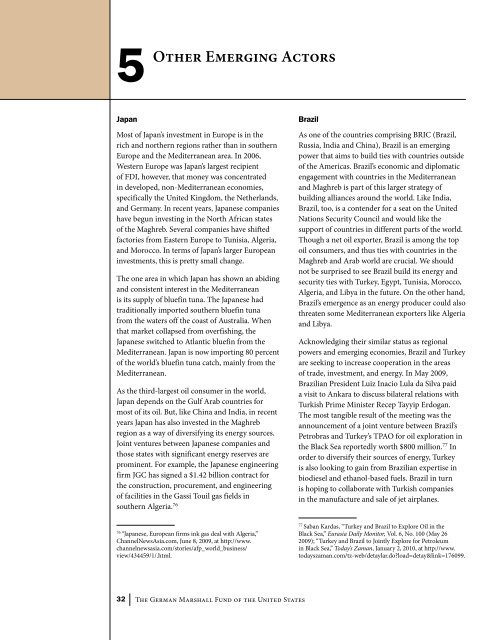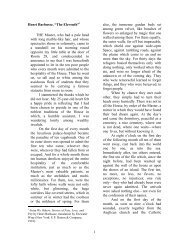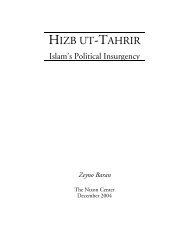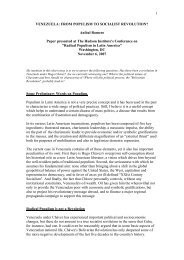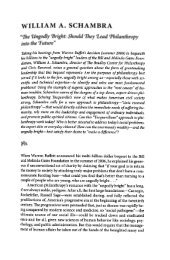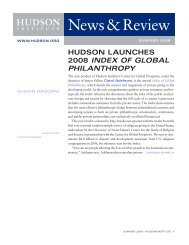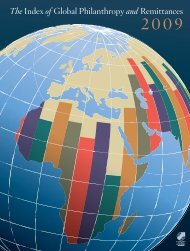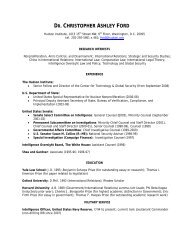NEW PLAYERS IN THE MEDITERRANEAN - German Marshall ...
NEW PLAYERS IN THE MEDITERRANEAN - German Marshall ...
NEW PLAYERS IN THE MEDITERRANEAN - German Marshall ...
You also want an ePaper? Increase the reach of your titles
YUMPU automatically turns print PDFs into web optimized ePapers that Google loves.
5<br />
Other Emerging Actors<br />
Japan<br />
Most of Japan’s investment in Europe is in the<br />
rich and northern regions rather than in southern<br />
Europe and the Mediterranean area. In 2006,<br />
Western Europe was Japan’s largest recipient<br />
of FDI, however, that money was concentrated<br />
in developed, non-Mediterranean economies,<br />
specifically the United Kingdom, the Netherlands,<br />
and <strong>German</strong>y. In recent years, Japanese companies<br />
have begun investing in the North African states<br />
of the Maghreb. Several companies have shifted<br />
factories from Eastern Europe to Tunisia, Algeria,<br />
and Morocco. In terms of Japan’s larger European<br />
investments, this is pretty small change.<br />
The one area in which Japan has shown an abiding<br />
and consistent interest in the Mediterranean<br />
is its supply of bluefin tuna. The Japanese had<br />
traditionally imported southern bluefin tuna<br />
from the waters off the coast of Australia. When<br />
that market collapsed from overfishing, the<br />
Japanese switched to Atlantic bluefin from the<br />
Mediterranean. Japan is now importing 80 percent<br />
of the world’s bluefin tuna catch, mainly from the<br />
Mediterranean.<br />
As the third-largest oil consumer in the world,<br />
Japan depends on the Gulf Arab countries for<br />
most of its oil. But, like China and India, in recent<br />
years Japan has also invested in the Maghreb<br />
region as a way of diversifying its energy sources.<br />
Joint ventures between Japanese companies and<br />
those states with significant energy reserves are<br />
prominent. For example, the Japanese engineering<br />
firm JGC has signed a $1.42 billion contract for<br />
the construction, procurement, and engineering<br />
of facilities in the Gassi Touil gas fields in<br />
southern Algeria. 76<br />
76<br />
“Japanese, European firms ink gas deal with Algeria,”<br />
ChannelNewsAsia.com, June 8, 2009, at http://www.<br />
channelnewsasia.com/stories/afp_world_business/<br />
view/434459/1/.html.<br />
Brazil<br />
As one of the countries comprising BRIC (Brazil,<br />
Russia, India and China), Brazil is an emerging<br />
power that aims to build ties with countries outside<br />
of the Americas. Brazil’s economic and diplomatic<br />
engagement with countries in the Mediterranean<br />
and Maghreb is part of this larger strategy of<br />
building alliances around the world. Like India,<br />
Brazil, too, is a contender for a seat on the United<br />
Nations Security Council and would like the<br />
support of countries in different parts of the world.<br />
Though a net oil exporter, Brazil is among the top<br />
oil consumers, and thus ties with countries in the<br />
Maghreb and Arab world are crucial. We should<br />
not be surprised to see Brazil build its energy and<br />
security ties with Turkey, Egypt, Tunisia, Morocco,<br />
Algeria, and Libya in the future. On the other hand,<br />
Brazil’s emergence as an energy producer could also<br />
threaten some Mediterranean exporters like Algeria<br />
and Libya.<br />
Acknowledging their similar status as regional<br />
powers and emerging economies, Brazil and Turkey<br />
are seeking to increase cooperation in the areas<br />
of trade, investment, and energy. In May 2009,<br />
Brazilian President Luiz Inacio Lula da Silva paid<br />
a visit to Ankara to discuss bilateral relations with<br />
Turkish Prime Minister Recep Tayyip Erdogan.<br />
The most tangible result of the meeting was the<br />
announcement of a joint venture between Brazil’s<br />
Petrobras and Turkey’s TPAO for oil exploration in<br />
the Black Sea reportedly worth $800 million. 77 In<br />
order to diversify their sources of energy, Turkey<br />
is also looking to gain from Brazilian expertise in<br />
biodiesel and ethanol-based fuels. Brazil in turn<br />
is hoping to collaborate with Turkish companies<br />
in the manufacture and sale of jet airplanes.<br />
77<br />
Saban Kardas, “Turkey and Brazil to Explore Oil in the<br />
Black Sea,” Eurasia Daily Monitor, Vol. 6, No. 100 (May 26<br />
2009); “Turkey and Brazil to Jointly Explore for Petroleum<br />
in Black Sea,” Today’s Zaman, January 2, 2010, at http://www.<br />
todayszaman.com/tz-web/detaylar.do?load=detay&link=176099.<br />
32<br />
The <strong>German</strong> <strong>Marshall</strong> Fund of the United States


